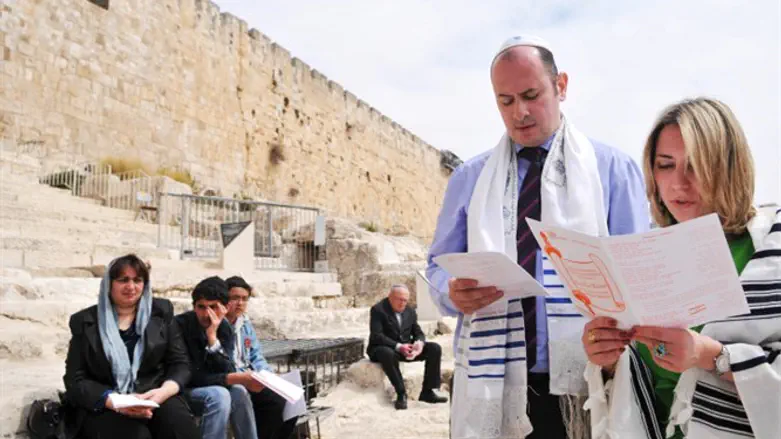
A significant number of Israelis identify with non-Orthodox religious movements, including the Reform and Conservative movements, a new study shows, though few Israelis are becoming actively involved in non-Orthodox congregations or other religious organizations.
According to a new study by the Jewish People Policy Institute, which was founded in Jerusalem in 2002 by the Jewish Agency for Israel, as many as 800,000 to 860,000 Israeli Jews say they identify with either the Reform or Conservative movements – a dramatic shift in a country where religious identity has traditionally been defined by the religious-secular divide.
Since the founding of the state in 1948, alternative Jewish religious movements, including the Reform, Conservative, Reconstructionist, and Renewal movements have failed to establish a significant presence in the Jewish state.
For decades, non-Orthodox religious movements were widely perceived as products of the Diaspora, with little relevance to Israeli society. While some Reform and Conservative congregations or communities were established in Israel, in the 1970s and 1980s, most were formed by American immigrants, including the Kibbutz Yahel (founded in 1977), and Kibbutz Lotan (founded in 1983).
But according to the new JPPI study, Israelis – particularly secular, left-leaning ones – are no longer put off by the Reform and Conservative movements’ Diaspora origins, and increasingly view alternative Jewish movements as a part of their non-Orthodox identity.
While polling data over the past few years has shown increases in the number of Israeli Jews who identity as either Reform or Conservative, the new JPPI study shows the largest number yet.
A survey by the Israel Democracy Institute in 2013 showed that between 7-8% of Israeli Jews say they identified with either the Reform or Conservative movements. A 2015 Pew poll showed that 5% of Israeli Jews identified as either Reform or Conservative. A Dialogue poll conducted last year placed the number at 11%.
The new JPPI survey, however, shows that as many as 13% of Israeli Jews identify as Reform or Conservative – equivalent to roughly 860,000 Jews, out of a total Israeli population of 8.84 million. Of that 13%, 8% identify as Reform, compared to 5% who identify as Conservative.
If accurate, Reform and Conservative-identifying Jews combined would outnumber haredi Jews in Israel.
The JPPI study shows that out of a total Israeli population of 8.84 million, 6.63 million – or 75% of Israel’s total population – identify as Jewish.
Of those 6.63 million self-identified Jews, just over a third (34.8%) identify as wholly secular (hiloni), compared to 22.1% who say they are secular-traditional (hiloni-masorti), 18.6% who are strongly traditional (masorti), and 22.5% who identified as either religious or haredi. Of those 22.5% who identified as religious or haredi, 9.1% said they identify as haredi, 1% identified as haredi-nationalist (haredi leumi, or ‘hardal’), 9.9% identified as religious (dati), and 2.5% identified as liberal-religious (dati-liberali).
The majority of Israeli Jews who said they identified as either Reform or Conservative were secular (hiloni), and were more likely to identify politically with as left-wing or center-left.
Geographically, self-identified Reform and Conservative Jews were most heavily concentrated in Tel Aviv, Jerusalem, Haifa, Modi’in, Ra’anana, and Mevaseret Zion.
Despite the large number of self-identified Reform and Conservative Jews, however, the JPPI study noted that the actual number of active members in either movement remained small – just a small fraction of the number of Israelis who claimed to identify as Reform or Conservative.
Only 4,500 Israelis are officially members of the Israeli Reform movement, with some 7,500 registered as members of the Conservative movement for a total of 12,000 members of non-Orthodox movements.
Among younger Israelis, the reach of the Reform and Conservative movements is even more limited. Just 400 Israeli youths are affiliated with Reform youth groups, compared to 1,400 for the Conservative movement.
Just 47 Reform congregations are active in Israel, including a mere 30 Reform synagogues. Slightly more Conservative congregations were counted (78), but just 26 included permanent synagogues.
A total of 110 Reform rabbis serve in Israel, compared to 170 Conservative rabbis, the study shows.
